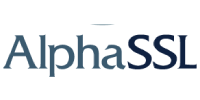Compare AlphaSSL vs Comodo SSL Certificate (Sectigo)
Brand Reputation: AlphaSSL is a subsidiary of GlobalSign, a name synonymous with trust and reliability in the cybersecurity industry. Comodo, once a stalwart in SSL certificates, has undergone rebranding and is now known as Sectigo. Both brands carry a strong reputation, instilling confidence in users seeking secure online interactions.
Validation Levels: Both AlphaSSL and Comodo (Sectigo) offer SSL certificates with varying levels of validation. They provide Domain Validation (DV) and Organization Validation (OV) certificates, ensuring encryption and basic validation of ownership and organization details. However, Comodo (Sectigo) takes a step further by also offering Extended Validation (EV) certificates, which provide the highest level of validation and display the organization’s name prominently in the browser’s address bar.
Features and Offerings: AlphaSSL’s focus lies in providing straightforward and cost-effective SSL certificates. Their offerings primarily include DV and OV certificates, catering to those seeking essential encryption. Comodo (Sectigo), on the other hand, offers a broader spectrum of options. Alongside DV and OV certificates, they provide EV certificates for enhanced trust and security. Moreover, Comodo (Sectigo) extends its offerings to include Wildcard and Multi-Domain certificates, accommodating websites with diverse security needs.
Warranty and Price: AlphaSSL certificates generally come with a lower warranty coverage compared to some other CAs. Comodo (Sectigo), with its wider range of certificates, offers higher warranty coverage, providing a financial safety net in the event of security breaches. Price points can vary significantly based on the type of certificate, validation level, and included features. While AlphaSSL tends to cater to budget-conscious users, Comodo (Sectigo) covers a broader price range due to its extensive offerings.
Customer Support: Both AlphaSSL and Comodo (Sectigo) offer customer support to guide users through certificate installation and management. Given the broader scope and brand recognition of Comodo (Sectigo), their support network might be more extensive, catering to a larger user base.
Browser Compatibility: Both AlphaSSL and Comodo (Sectigo) certificates enjoy compatibility with major web browsers and devices. This ensures that users visiting websites secured by these certificates will experience a seamless and secure browsing experience.
Additional Features: AlphaSSL focuses primarily on providing core SSL functionality without many additional features. In contrast, Comodo (Sectigo) offers supplementary features such as vulnerability assessments, website seals, and malware scanning, enriching their SSL certificates with added layers of security and trust.
Brand Recognition: While Comodo was a widely recognized name in the SSL industry before its rebranding to Sectigo, the change in nomenclature might impact brand recognition and user trust. AlphaSSL, as part of the established GlobalSign family, carries a sense of familiarity and security.[/vc_column_text][/vc_column][/vc_row]
General Comparison FAQs
1. What’s the main difference between Comodo SSL and AlphaSSL?
Comodo (now Sectigo) offers a wide range of SSL types (DV, OV, EV, Wildcard, SAN), while AlphaSSL focuses on affordable DV certificates with fast issuance and minimal pricing.
2. Which is more trusted: Comodo or AlphaSSL?
Both are trusted CAs. Comodo (Sectigo) has over 20 years in the market, while AlphaSSL is backed by Sectigo with identical root trust and browser compatibility.
Pricing & Value FAQs
3. Which is cheaper: Comodo or AlphaSSL?
AlphaSSL DV certificates are typically the most budget‑friendly available (often under $10/year). Comodo has higher-priced DV, plus more expensive OV and EV tiers.
4. Does either offer bulk or multi-year discounts?
Yes. Comodo and AlphaSSL resellers often offer discounts for multi‑year plans or bulk purchases, though AlphaSSL is commonly discounted first for DV plans.
Issuance & Management FAQs
5. Which one issues certificates faster?
AlphaSSL DV certs are usually issued within minutes. Comodo DV is also fast (~5–15 min). OV and EV from Comodo take 1–5 business days due to business verification.
6. Can I reissue or revoke certificates from either provider?
Yes. Both Comodo and AlphaSSL (through Sectigo) allow free unlimited reissues and revocations during the certificate period.
Features & Scope FAQs
7. Does AlphaSSL support wildcard or SAN certificates?
No. AlphaSSL only provides single-domain DV certificates. Comodo offers wildcard and SAN/multi-domain certificates in its portfolio.
8. Which offers higher validation levels?
Comodo provides DV, OV, and EV certificates. AlphaSSL is limited to DV only, suitable for basic SSL needs.
Security, Warranty & Compatibility FAQs
9. Are encryption levels the same for both?
Yes. Both use industry-standard 256-bit encryption and SHA-2 with RSA/ECC keys, offering full browser support.
10. What about warranty coverage?
Comodo DV comes with up to $250,000 warranty; OV/EV offer up to $1.75 million. AlphaSSL DV typically includes lower warranty (up to $10,000–$50,000).
Use Case & Deployment FAQs
11. Which certificate is better for small websites/ blogs?
AlphaSSL is ideal for small personal or micro-business websites needing fast, affordable DV protection with easy install.
12. What’s best for businesses, eCommerce, or subdomain needs?
Comodo is better for businesses requiring OV, EV, wildcard, or SAN certificates — especially for branding, multiple subdomains, or legal trust signals.
Installation & Support FAQs
13. Can I install either on any web server?
Yes. Certificates from both brands are compatible with Apache, Nginx, cPanel, IIS, and other major control panels.
14. What support is available?
Comodo (Sectigo) provides 24/7 support via resellers. AlphaSSL support varies by reseller—usually limited to ticket-based assistance.



